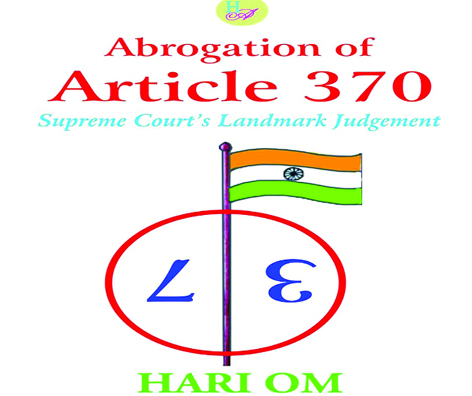K L Bhatia
Professor Hari Om
Published by Har-Anand Publications Pvt Ltd,
New Delhi 2024
The book under review presents a scholastic analysis of “problem in Kashmir” by a Professor of History. Problem in Kashmir had been because of Articles 370 (306A), 35A and separate constitution of Jammu Kashmir, 1956, besides, secession threatened in Kashmir by secessionists, separatists and terrorists that made Jammu Kashmir to suffer. Sheikh Mohammad Abdullah, leader of the Muslims in the Vale of Kashmir, found the inclusion of Article 370 in the ‘Temporary and Transitional Provisions of the Constitution of India’s Part XXI. He wanted ‘iron-clad guarantees of autonomy’. (Granville Austin, Working A Democratic Constitution The Indian Experience, Oxford, 2000 151; Ajit Bhattacharjea, Kashmir The Wounded Valley, 1994, 181).
The author also makes a pedagogic analysis of Apex Court’s verdict of December 11, 2023 (476 pages) that will be remembered as a historic day in the independence history of India and will be written in golden words in the modern history of Indian Judiciary since the Apex Court erased the black chapters of 19th October 1949 when Article 370 (306A) was got inserted in the Constitution of India under process while ignoring the policy statement of Maharaja Hari Singh of 15th July 1946: “Naturally we are interested in the progress of India as a whole. My views on the subject are well known and on more than one occasion I have given expression to them. They are briefly that we look forward to taking our due place in the new constitutional structure of India, whereby we hope that India will be able to take its proper place as a great nation, one of the brotherhood of nations, and to wield great influence in the affairs of the world, thus adding to human civilization those aspects of great culture which will help to solve the problems of mankind”. (see Durga Das, Sardar Patel’s Correspondence, 1945-1950, Vol. 1, 1971, pp. 13-15); and Dr. B. R. Ambedkar’s unequivocal reply to Sheikh Mohammad Abdullah: “You want India to defend Kashmir, give Kashmiris equal rights all over India, but you want to deny India and Indians all rights in Kashmir. I am Law Minister of India. I can’t be a party to such a betrayal of National interests”. (See K. L. Bhatia, Jammu and Kashmir Article 370 of the Constitution of India, 1997, pp. 34-35; K. L. Bhatia, Constitution Pilgrimage Strengthening Federalism, January 4, 2024).
The Apex Court also corrected the wrongs of 15th May 1954 when Article 35A was added ostensibly as a rarest example of invisible hands of invisible State in the Constitution by an Executive Order by overreaching the Constituent powers of the Parliament of India. The Court expounded new constitutionalism by correcting the wrongs of over seventy years of past tense, imperfect and indefinite state of affairs by abrogating Articles 370, CO 1954 and evaporating the soup and sauce of separate constitution of Jammu Kashmir and as such streamlined the process of One Nation, One Constitution, One National Flag, One Citizenship, One Nationality, One Domicile in the nationalistic fervor thus strengthening the indestructible union of Indian Federalism — a unique concept in the family of constitutionalism.
In abrogating Articles 370, 35A, repeal of Jammu Kashmir constitution and Reorganisation of Jammu Kashmir State in two Union Territories due process of law has been followed. When there seems no aberration or deviation or eccentricity from due process of law then ‘aberration HANGAMA KIYUN BARPA HAI’ by those who have been habitual of living in the confines of fiefdom ‘dynasty in democracy’ rather learn as well as realize to come out of its hibernation as well as cobweb and learn to live under the rule/annals of constitutional democracy to enjoying the fruits of Kashmiriyyat, Jamhuriyyat and Insaniyyat — the epitome of mutual trust and faith.
Trending Now
E-Paper


